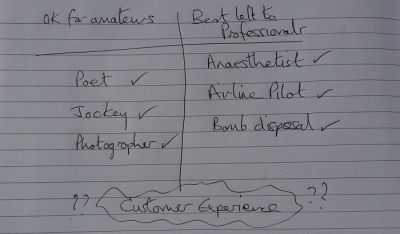
Customer Experience: Too Important to Leave to the Professionals?
A little while ago I sat in a conference room listening to a (rightly) well-respected customer experience guru propound the importance of Customer Experience becoming a profession. Through recognised qualifications, methodologies and practitioner groups Customer Experience could become established and respected.
It’s hard to argue with that logic. Over the past few decades HR, technology and marketing have joined legal services and accountancy to gain perceived stature through becoming recognised as professional activities, best trusted to qualified experts. Even in a world of work where it’s increasingly difficult for outsiders to understand from job titles what people actually do, there is organisational cachet and implied authority from having a ‘professional job’. And professional roles and disciplines tend to become indispensable by being ‘baked in’ to organisational design and operating models.
Great. As far as it goes.
A little while ago I sat in a conference room listening to a (rightly) well-respected customer experience guru propound the importance of Customer Experience becoming a profession. Through recognised qualifications, methodologies and practitioner groups Customer Experience could become established and respected.
It’s hard to argue with that logic. Over the past few decades HR, technology and marketing have joined legal services and accountancy to gain perceived stature through becoming recognised as professional activities, best trusted to qualified experts. Even in a world of work where it’s increasingly difficult for outsiders to understand from job titles what people actually do, there is organisational cachet and implied authority from having a ‘professional job’. And professional roles and disciplines tend to become indispensable by being ‘baked in’ to organisational design and operating models.
Great. As far as it goes.
But isn’t one of the repeated discoveries of customer experience that organisations are expert at – almost invariably inadvertently – making life difficult for customers? Even when insightful experts, with a brief to focus on the consumer, are engaged, they (we!) all too often lose that focus. Stuff gets in the way. Stuff like the need to handle customer data compliantly, to meet revenue targets, the complexity of managing partnerships, the challenge of moving onto new channels before full systems integration has been assured, etc, etc.
So, who rescues organisations from these unintentional but potentially damaging errors? Well, sometimes its internal Customer Experience experts and/or external consultants or advisors (like Channel Doctors). But most often it’s the amateurs – frontline staff and customers. They see through the fog of organisational imperatives to what’s getting in the way of a positive customer (and colleague) experience.
Of course, calling out what’s wrong isn’t sufficient. Even with the great and usually unexploited potential to utilise colleagues and customers to help improve processes and experiences, there’s still a vital role for seasoned professionals to bring these to life. It’s just that not all problems need professional experts to solve (or even identify) them.
When it comes to Customer Experience the real experts are often amateurs.



